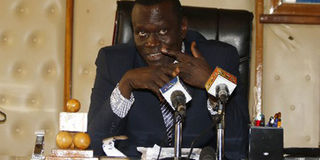Police assure local residents of peace in Naivasha and warn hatemongers

Rift Valley Regional Coordinator Wanyama Musiambo addresses journalists at his office in Nakuru on May 17, 2016. PHOTO | SULEIMAN MBATIAH | NATION MEDIA GROUP
What you need to know:
- Administrators said they would do their best to ensure violence did not erupt again.
Naivasha is back in the spotlight after Rift Valley Regional Commissioner Wanyama Musiambo claimed hate leaflets found in some parts of Nakuru were authored by people in the town.
The administrators were worried that such leaflets would spell doom to the thriving hospitality industry and the lucrative flower business.
Naivasha, which is in Nakuru county, was one of the areas that bore the brunt of the 2007-2008 post-election violence.
The leaflets had caused jitters among the inhabitants of the cosmopolitan town.
Security agents held a meeting to forestall any potential threat to prevailing peace.
The three-day deliberations included National Cohesion and Integration Commission (NCIC) commissioners Adan Mohammed, Morris Dzoro, religious leaders and peace crusaders.
With the ugly memories of 2007-2008 still vivid in the minds of residents, the administrators assured them that they would do their best to ensure the violence did not erupt again.
“We don’t want to be firefighters...but rather we will be proactive in ensuring that peace prevails in this county,” said Mr Musiambo.
He said he would to go after hate mongers: “We are coming for you; we have the capacity and the right personnel to make arrests”.
Speaking after officially closing the peace meeting, Mr Musiambo cautioned political leaders against any form of incitement, saying the government was committed to maintaining law and order.
Mr Dzoro acknowledged that demonstrations against the electoral commission had caused tension in Naivasha and necessitated the peace meeting.
The NCIC commissioner called on the peace crusaders to be vigilant and report individuals inciting the public and also alert the police on potential conflict areas.
Mr Dzoro accused the courts of hindering the prosecution of hate speech offenders despite the Commission presenting “water tight evidence”.
“We are able to gather evidence which we present in court but we don’t see serious prosecutions,” said Mr Dzoro.
Commissioner Mohammed said NCIC was banking on amendments that propose to give the commission powers to arrest, investigate and prosecute.
“If passed in Parliament, the amendments would give the commission more powers to deal with hate offenders,” he said.
The amendments also proposes lengthy jail terms for politicians found guilty of incitement charges.
Religious leaders too promised to be in the forefront in ensuring peace prevails in Naivasha before and after elections by convening meetings that bring together inhabitants of Naivasha regardless of their ethnic background.





